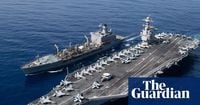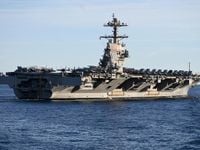In a move that’s sending ripples through Latin America and beyond, the United States has dramatically escalated its military presence in the Caribbean, deploying the USS Gerald R. Ford—the world’s largest aircraft carrier—alongside a formidable carrier strike group. This bold step, announced by the Pentagon on October 24, 2025, marks the most significant American military buildup in the region since the Cold War and is aimed squarely at what Washington describes as a war on narco-terrorist organizations operating from Venezuela.
According to Pentagon spokesman Sean Parnell, the USS Gerald R. Ford is not sailing alone. The carrier is accompanied by a cruiser, three destroyers, and nine aircraft squadrons, all tasked with enhancing U.S. capabilities to disrupt drug trafficking and dismantle transnational criminal organizations. In addition to this already impressive show of force, the U.S. has deployed nuclear submarines, F-35 fighter jets, MQ-9 Reaper drones, P-8 Poseidon reconnaissance planes, and even B-52 bombers. The MV Ocean Trader, a so-called 'ghost ship' used by U.S. Special Forces for covert operations, is also now in the mix, blending in with commercial shipping traffic as it supports clandestine missions.
This military surge follows President Donald Trump’s declaration of a state of armed conflict with drug cartels, a move that grants American commanders broad authority to pursue traffickers well beyond U.S. borders. Trump’s strategy, as reported by AFP and LBC, is to treat narco-terrorists with the same resolve as Al-Qaeda—mapping their networks, tracking their personnel, and eliminating them wherever they operate.
Secretary of Defense Pete Hegseth has not minced words about the new posture. In a recent statement on X (formerly Twitter), Hegseth declared, "If you are a narco-terrorist smuggling drugs in our hemisphere, we will treat you like we treat Al-Qaeda. Day or NIGHT, we will map your networks, track your people, hunt you down, and kill you." This aggressive rhetoric has been matched by action: since early September, U.S. forces have conducted at least ten lethal strikes against vessels allegedly used for drug smuggling, resulting in 43 fatalities among suspected cartel members. The most recent strike targeted a boat linked to the Venezuelan gang Tren de Aragua, killing six people in the Caribbean Sea.
The Pentagon’s new joint task force, operating under U.S. Southern Command, is coordinating these wide-ranging operations. The Army’s elite 160th Special Operations Aviation Regiment, known as the 'Night Stalkers,' has also been deployed for clandestine missions, further underscoring the seriousness of the American commitment. With approximately 10,000 U.S. troops now stationed in the Caribbean, the scale of the operation is hard to overstate.
But this show of force is not without controversy—far from it. Venezuelan President Nicolas Maduro has accused the U.S. of fabricating a pretext for war and claims to have mobilized millions of troops in response. In a televised address, Maduro warned, "They promised they would never again get involved in a war, and they are fabricating a war that we are going to prevent." His government, which Washington does not recognize as legitimate, has flooded Venezuelan airwaves with anti-Trump propaganda and vowed to respond forcefully to any attempt at regime change. Foreign Minister Vladimir Padrino echoed these sentiments, stating, "Interpret it however you want: the Armed Forces will not allow a government here that is subservient to the interests of the United States. This is the most significant military threat in the last 100 years. We do not want war, we want peace."
The regional fallout has been swift. Colombia’s President Gustavo Petro, a vocal critic of the U.S. strikes, was sanctioned by the U.S. Treasury on October 24, 2025, for allegedly allowing drug trafficking to flourish. Petro has accused Trump of murder over the strikes on alleged drug boats. Meanwhile, Brazil, the region’s largest country, has voiced deep concern. Celso Amorim, a senior advisor to President Luiz Inacio Lula da Silva, told AFP, "We cannot accept an outside intervention because it will trigger immense resentment. It could inflame South America and lead to radicalization of politics on the whole continent."
Despite these warnings, President Trump has doubled down. On October 23, 2025, he stated that he does not need congressional approval to attack Venezuela or any other country he accuses of involvement in the drug trade, even hinting that strikes on land could be next. "The land is going to be next," Trump said, likening drug cartels to the Islamic State. He also authorized the CIA to conduct operations in Venezuela, a move that has further heightened tensions and speculation about the administration’s true intentions.
Critics, including some Democratic lawmakers and international law experts, have expressed alarm at the speed and secrecy of the escalation. Several UN officials and legal scholars have described the U.S. strikes as clear violations of both U.S. and international law, amounting to extrajudicial executions. There is also skepticism about the Trump administration’s claims, with internal U.S. intelligence assessments reportedly finding little evidence that the Maduro government directly controls criminal groups or that Venezuela plays a major role in the global drug trade.
Yet for the Trump administration, the narrative is clear: Venezuela is a hub for narco-terrorism, and bold action is required. The deployment of the USS Gerald R. Ford and its strike group is intended, according to Pentagon spokesperson Sean Parnell, "to bolster U.S. capacity to detect, monitor, and disrupt illicit actors and activities that compromise the safety and prosperity of the United States homeland and our security in the Western Hemisphere."
The arrival of the carrier strike group is still pending—the USS Gerald R. Ford was last reported in the Mediterranean Sea as of October 24, and its arrival time in Latin America remains unclear. But the message has already been sent: the United States is prepared to use overwhelming military force to achieve its objectives in the region, regardless of the diplomatic and humanitarian risks.
As the world watches, the Caribbean finds itself at the epicenter of a rapidly evolving conflict, with the potential for even wider regional ramifications. Whether this will lead to the dismantling of powerful criminal organizations or plunge the hemisphere into deeper instability remains to be seen. For now, all eyes are on the horizon—and on the massive silhouette of the USS Gerald R. Ford as it steams toward Latin America.


